We went to see An Inconvenient Truth the other night, Al Gore’s film about global warming—or more specifically, the documentary about Gore’s ongoing campaign to raise awareness about the imminent ecological catastrophe posed by global warming. I was very interested to see this film, if for no other reason than for the press it has received well in advance of its release from the right-wing media.
Now, we all know that Gore is one of the Right’s favourite punching bags—you can practically hear them clapping their hands in glee every time he opens his mouth, and of course none of the vitriol they spew has to do with the substance of what he’s saying so much as to mock his woodenness, his lack of charisma and to generally throw the 2000 election in his face again. So we of course expect an escalated attack when he has the temerity to be in a film, and to talk about an environmental issue! And those expectations were not disappointed … based on what O’Reilly, Coulter, et al had to say, you’d think this film was a collaborative project between Michael Moore and Leni Riefenstahl after they’d smoked a pound of crack. Tucker Carlson called Gore a “zealot,” a “Bible-thumper” and a “wide-eyed religious nut” whose religion “is the environment” (always interesting to see the proponents of the far right using accusations of religious zealotry against progressives—check out Coulter’s new book); conservative think-tanker Sterling Burnett compared Gore to Goebbels; Glenn Beck went one further and compared him to Hitler; Ann Coulter called Gore “clinically insane”; and Chris Matthews says of the lecture series on which An Inconvenient Truth is based that it is a result of Gore having “lost it” after the 2000 election, that he became unhinged and embraced environmentalism—which ignores the fact that Gore has been an advocate for action on climate change since the mid-70s, when he was first elected to Congress.
So what of the film? As it turns out, it is an understated, intense and measured discussion of the basic tenets of the science behind climate change; it presents its case firmly and systematically, eschewing alarmist rhetoric in favour of considered arguments. Gore doing his lectures is relaxed, even funny at times; he radiates a sense of calm but impassioned purpose, he is articulate, and above all, his displays at once a deep intelligence and a willingness, an eagerness to learn and engage in discussion.
And I kept thinking to myself: why in the name of all that is good and holy is this man not the president???
Thursday, June 29, 2006
Monday, June 26, 2006
Rule, Britannia (sort of)
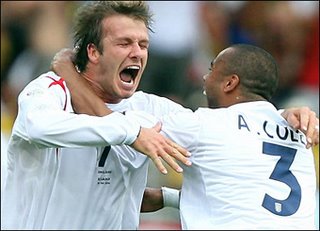 Well, we're through to the quarter-finals, thanks to one miraculous defensive play that kept out an Ecuadorian goal, and an exquisite strike by David Beckham ... but I don't have very high hopes for the boys, I must say. Four matches with three wins and a draw, and some of the most uninspiring football played at the World Cup so far. It sort of reminds me of the Canadian effort in hockey at the last winter Olympics -- a whole lot of stars but not much of a team. Alas.
Well, we're through to the quarter-finals, thanks to one miraculous defensive play that kept out an Ecuadorian goal, and an exquisite strike by David Beckham ... but I don't have very high hopes for the boys, I must say. Four matches with three wins and a draw, and some of the most uninspiring football played at the World Cup so far. It sort of reminds me of the Canadian effort in hockey at the last winter Olympics -- a whole lot of stars but not much of a team. Alas.Still, it does look like the boys will likely see it through to the semis, considering the yellow- and red-card fest that was the Netherlands-Portugal showdown. At which point, barring a spectacular upset, we get to show down Brazil. Which is where things get, well, tricky. It's not that I don't believe England can beat Ronaldhino and company -- it's just that they ain't gonna do it playing the kind of football they've been playing so far.
I have to say though, part of me -- the part of me not slavishly desiring to see England win at any cost, the part of me just keen to see some spectacular soccer -- is pretty stoked at the prospect of watching a Germany-Brazil final. The Germany games I've watched have been awe-inspiring ... they've played something approaching perfect football at times, and to see them facing down the current world champions on their home turf? Like the music of he spheres. A soccer symphony, if you like.
I was being so productive back here in London, getting a lot of research and work done -- and then the World Cup began. And it occurs to me that the next World Cup in four years comes perilously close to that time when I'll be coming up for tenure. If I don't get tenure, do you think I can su FIFA?
In other news, Britannia rules for other reasons -- namely, my dear friend Jeremy of North London and the booming sonorous voice got married this past saturday, and this humble blog shares in the joy of him and his new bride Chris. Aren't they a lovely couple?
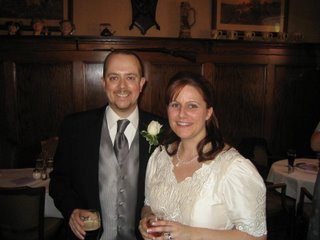 I swear, no one can wear a tux like Jer. Classes up the joint wherever he goes.
I swear, no one can wear a tux like Jer. Classes up the joint wherever he goes.
Monday, June 19, 2006
Shameless theft!
Yup, the inspiration for today's post I have shamelessly stolen from everyone's favourite dangerous academic Michael Berube. Last friday he posted on little things -- little things that make life worth living, specifically with regard to "human expressive culture," i.e. books, movies, music, etc ... those moments that you never get tired of, a particular chord or downbeat in a song, a character's expression at a key moment, a line from a book that you read over and over.
Being the lover of arbitrary and obscure lists that I am, this had me thinking all weekend, with the following thoughts (in no particular order).
Little things I love:
Judi Dench's eyebrows in Shakespeare in Love -- especially when her Queen Elizabeth makes a sharp little joke at Wessex's (Colin Firth's) expense.
The piano bits in Just Like Heaven by The Cure.
CJ: I need you to pardon a turkey.
Bartlet: Didn’t I pardon a turkey yesterday?
CJ: This is a different turkey.
Bartlet: I’m not going to get a reputation for being soft on tukeys?
John Goodman in The Big Lebowski holding forth on the moral bankruptcy of nihilism.
The bit at the beginning of "Vertigo" where Bono says "Turn it up there, captain."
Peter Sellers as the president in Dr. Strangelove, on the phone to the Russian premier, telling him that an air force colonel has just ordered his bombers to attack their targets: "Well, I’ll tell you what he did. He ordered his planes… to attack your country… Ah… Well, let me finish, Dmitri… Let me finish, Dmitri...”
There are way too many on the Simpsons to list, but here's one of my faves, Homer realizing that Marge has a gambling problem: "Kids, your mother has been possessed by a monster. A gambling monster! I call him GAMBLOR!"
Ian McKellen in Richard III: "I'm not made of stone." (You have to see it to understand why it's brilliant)
More Sir Ian: in LOTR, "A wizard is never late, Mr. Frodo ..."
Stephen Baldwin in The Usual Suspects, set up on a roof with a sniper rifle and counting off all the people he's about to shoot: "Oswald was a pussy!"
That little guitar flourish and pause toward the end of “Buddy Holly” by Weezer ... it's especially great while running, coming down hard on my stride as the music crashes in again.
I could go on ... too much fun. Anyway, I want to hear other people's lists: especially those who read this blog and never comment! And as the good Dr. Berube stipulates in his original, this is little things: as he states, "You can’t cheat and say, 'Der Ring des Nibelungen always does it for me, personally' or 'I find myself turning once again to the Chorus’s "Wonders are many, and none is more wonderful than man’ speech in Antigone".' Little things. The sillier the better.
Being the lover of arbitrary and obscure lists that I am, this had me thinking all weekend, with the following thoughts (in no particular order).
Little things I love:
Judi Dench's eyebrows in Shakespeare in Love -- especially when her Queen Elizabeth makes a sharp little joke at Wessex's (Colin Firth's) expense.
The piano bits in Just Like Heaven by The Cure.
CJ: I need you to pardon a turkey.
Bartlet: Didn’t I pardon a turkey yesterday?
CJ: This is a different turkey.
Bartlet: I’m not going to get a reputation for being soft on tukeys?
John Goodman in The Big Lebowski holding forth on the moral bankruptcy of nihilism.
The bit at the beginning of "Vertigo" where Bono says "Turn it up there, captain."
Peter Sellers as the president in Dr. Strangelove, on the phone to the Russian premier, telling him that an air force colonel has just ordered his bombers to attack their targets: "Well, I’ll tell you what he did. He ordered his planes… to attack your country… Ah… Well, let me finish, Dmitri… Let me finish, Dmitri...”
There are way too many on the Simpsons to list, but here's one of my faves, Homer realizing that Marge has a gambling problem: "Kids, your mother has been possessed by a monster. A gambling monster! I call him GAMBLOR!"
Ian McKellen in Richard III: "I'm not made of stone." (You have to see it to understand why it's brilliant)
More Sir Ian: in LOTR, "A wizard is never late, Mr. Frodo ..."
Stephen Baldwin in The Usual Suspects, set up on a roof with a sniper rifle and counting off all the people he's about to shoot: "Oswald was a pussy!"
That little guitar flourish and pause toward the end of “Buddy Holly” by Weezer ... it's especially great while running, coming down hard on my stride as the music crashes in again.
I could go on ... too much fun. Anyway, I want to hear other people's lists: especially those who read this blog and never comment! And as the good Dr. Berube stipulates in his original, this is little things: as he states, "You can’t cheat and say, 'Der Ring des Nibelungen always does it for me, personally' or 'I find myself turning once again to the Chorus’s "Wonders are many, and none is more wonderful than man’ speech in Antigone".' Little things. The sillier the better.
Friday, June 16, 2006
Recent Reading
Well, it’s that time again—time for another installment of What I’ve been Reading Lately. One of the pleasures of the two months since classes ended has been somewhat more time to devote to reading not (directly) related to work … Given that I’m currently filling my days with the history and criticism of modern American poetry and studies of masculinity in the cold war, it’s been a delicious pleasure to turn to the following books in the evenings and on weekends …
Ian MacEwan, Atonement. My familiarity with MacEwan is still limited, this being only the second of his novels I’ve read (the first, as blogged recently, was Saturday). Atonement is a startlingly good read, written in MacEwan’s concise engaging prose and featuring a compelling cast of characters—in this case, the members of a quasi-aristocratic family in mid-1930s Britain, who beneficence has led them to take the son of their gardener—of an age with the elder daughter—under their wing, and see to his education. A misunderstood communication between the gardener’s son and the family’s daughter, and the meddling in their affairs of the youngest daughter, and a narrative of tension, of sexual awakening, injustice and, yes, atonement unfolds … highly recommended.
Saul Bellow, Herzog. This one was both business and pleasure—there was no immediate reason, research- or teaching-wise to read Bellow, but then as an ostensible expert on postwar American fiction, my general unfamiliarity with his novels has been an unforgivable gap. Herzog is a work of brilliance, the story of a self-absorbed and arrogant but likable and hapless academic (I love stories that hit you where you live), whose recent divorce and what her perceives as the betrayal by friends and colleagues causes him to come somewhat unhinged. The novel has no specific plot, but is instead a series of reminisces on the part of the eponymous Moses Herzog, interspersed with manic letter-writing to people ranging from his psychiatrist to Dwight D. Eisenhower. As Philip Roth astutely observes, Bellow is one of Joyce’s great literary heirs (as Roth is one of Bellow’s), but where Joyce withholds from his characters his promiscuous and wide-ranging erudition, Bellow bestows all of his great intellect on Herzog—to the point that we both pity the poor man and stand in awe of his mind.
Anthony Bourdain, Kitchen Confidential. Kristen bought me this book to read along the way from St. John’s—a memoir by bad-boy chef Bourdain, and a very revealing glance at the often seamy life of restaurant kitchens. This is a great read; Bourdain is both eloquent and irreverent and imparts some very useful advice along the way (never eat seafood on Mondays, avoid the brunch specials, if you like your steak well-done, don’t bother getting it at a decent restaurant). He has nothing less that utter contempt for the luminaries of the Food Network, never missing a chance to get in a dig at Emeril Lagasse (for whom he has a particular loathing). What is perhaps most interesting however is the glance into the psychoses that lead people into such a high-pressure career, in which drug and alcohol abuse is de rigeur, full of massive egos and megalomaniacs, at which one must work as a low-paid peon for years and years under the thumb of said dictators, and at which success is at best a capricious thing. Why do people do this? It’s all about the food, baby.
Stephen Lewis, Race Against Time. I’ve always had a massive respect for Stephen Lewis, and this book—the publication of his Massey Lectures in 2005—only adds to that. Here Lewis speaks frankly about his work for the UN as special envoy to Africa, about the crushing horrors gripping that AIDS- and poverty-stricken continent, and he does so without sparing the United Nations (an organization he nevertheless holds in high and optimistic esteem), or any of the other players on the global stage. He also does not spare Canada, singling his own nation out for especial rebuke. The book is required reading, if for no other reason than that it does a good job in cutting through the haze of sentiment and misinformation generated by the UN itself, by the G8 and by such events as Live8.
George MacDonald Fraser, Flashman’s Lady and Flashman and the Mountain of Light. Flash is back! The third and fourth installments of the Flashman papers have everyone’s favourite bounder fighting pirates in Borneo and Sikhs in India, respectively. Flashman’s Lady was a bit of a disappointment; much of its first half is devoted to the vagaries of cricket, which even after a hundred pages of Fraser’s not-inconsiderable writing talents I still do not understand in the least. The latter however does not disappoint, as it has Flashy playing political agent in Punjabi India, romancing an insatiable maharani and her equally arduous maid and playing a pivotal role in deciding the future of British India. The great irony of this one is that for once Flashy actual behaves like he’s supposed to (albeit reluctantly, and with quaking bowels), and actually pulls the British fat out of the fire, but gets no credit whatsoever! For a man accustomed to fleeing in terror and receiving credit for courage and glory at home, that must be a hard pill to swallow …
Nick Hornby, Fever Pitch and About a Boy. As discussed in my previous post, I was called upon to be an expert about the novels of Nick Hornby … which prompted me to read some of the books about which I was supposed to know things. As I mentioned, Fever Pitch is an excellent read, and so far my favourite of what Hornby has done. It may be that I saw the film before reading the novel, but About a Boy does come across as a bit formulaic … nevertheless, it remains a good read—written with Hornby’s signature wit—and I was pleased to see that the film’s ending was an invention of the filmmakers. It distressed me to think that Nick would write something quite that trite.
Ian MacEwan, Atonement. My familiarity with MacEwan is still limited, this being only the second of his novels I’ve read (the first, as blogged recently, was Saturday). Atonement is a startlingly good read, written in MacEwan’s concise engaging prose and featuring a compelling cast of characters—in this case, the members of a quasi-aristocratic family in mid-1930s Britain, who beneficence has led them to take the son of their gardener—of an age with the elder daughter—under their wing, and see to his education. A misunderstood communication between the gardener’s son and the family’s daughter, and the meddling in their affairs of the youngest daughter, and a narrative of tension, of sexual awakening, injustice and, yes, atonement unfolds … highly recommended.
Saul Bellow, Herzog. This one was both business and pleasure—there was no immediate reason, research- or teaching-wise to read Bellow, but then as an ostensible expert on postwar American fiction, my general unfamiliarity with his novels has been an unforgivable gap. Herzog is a work of brilliance, the story of a self-absorbed and arrogant but likable and hapless academic (I love stories that hit you where you live), whose recent divorce and what her perceives as the betrayal by friends and colleagues causes him to come somewhat unhinged. The novel has no specific plot, but is instead a series of reminisces on the part of the eponymous Moses Herzog, interspersed with manic letter-writing to people ranging from his psychiatrist to Dwight D. Eisenhower. As Philip Roth astutely observes, Bellow is one of Joyce’s great literary heirs (as Roth is one of Bellow’s), but where Joyce withholds from his characters his promiscuous and wide-ranging erudition, Bellow bestows all of his great intellect on Herzog—to the point that we both pity the poor man and stand in awe of his mind.
Anthony Bourdain, Kitchen Confidential. Kristen bought me this book to read along the way from St. John’s—a memoir by bad-boy chef Bourdain, and a very revealing glance at the often seamy life of restaurant kitchens. This is a great read; Bourdain is both eloquent and irreverent and imparts some very useful advice along the way (never eat seafood on Mondays, avoid the brunch specials, if you like your steak well-done, don’t bother getting it at a decent restaurant). He has nothing less that utter contempt for the luminaries of the Food Network, never missing a chance to get in a dig at Emeril Lagasse (for whom he has a particular loathing). What is perhaps most interesting however is the glance into the psychoses that lead people into such a high-pressure career, in which drug and alcohol abuse is de rigeur, full of massive egos and megalomaniacs, at which one must work as a low-paid peon for years and years under the thumb of said dictators, and at which success is at best a capricious thing. Why do people do this? It’s all about the food, baby.
Stephen Lewis, Race Against Time. I’ve always had a massive respect for Stephen Lewis, and this book—the publication of his Massey Lectures in 2005—only adds to that. Here Lewis speaks frankly about his work for the UN as special envoy to Africa, about the crushing horrors gripping that AIDS- and poverty-stricken continent, and he does so without sparing the United Nations (an organization he nevertheless holds in high and optimistic esteem), or any of the other players on the global stage. He also does not spare Canada, singling his own nation out for especial rebuke. The book is required reading, if for no other reason than that it does a good job in cutting through the haze of sentiment and misinformation generated by the UN itself, by the G8 and by such events as Live8.
George MacDonald Fraser, Flashman’s Lady and Flashman and the Mountain of Light. Flash is back! The third and fourth installments of the Flashman papers have everyone’s favourite bounder fighting pirates in Borneo and Sikhs in India, respectively. Flashman’s Lady was a bit of a disappointment; much of its first half is devoted to the vagaries of cricket, which even after a hundred pages of Fraser’s not-inconsiderable writing talents I still do not understand in the least. The latter however does not disappoint, as it has Flashy playing political agent in Punjabi India, romancing an insatiable maharani and her equally arduous maid and playing a pivotal role in deciding the future of British India. The great irony of this one is that for once Flashy actual behaves like he’s supposed to (albeit reluctantly, and with quaking bowels), and actually pulls the British fat out of the fire, but gets no credit whatsoever! For a man accustomed to fleeing in terror and receiving credit for courage and glory at home, that must be a hard pill to swallow …
Nick Hornby, Fever Pitch and About a Boy. As discussed in my previous post, I was called upon to be an expert about the novels of Nick Hornby … which prompted me to read some of the books about which I was supposed to know things. As I mentioned, Fever Pitch is an excellent read, and so far my favourite of what Hornby has done. It may be that I saw the film before reading the novel, but About a Boy does come across as a bit formulaic … nevertheless, it remains a good read—written with Hornby’s signature wit—and I was pleased to see that the film’s ending was an invention of the filmmakers. It distressed me to think that Nick would write something quite that trite.
Monday, June 12, 2006
Christopher Lockett, MA (Master of Arts), PhD (Doctor of Philosophy), MW (Media Whore)
So this was interesting.
Somewhat less than a week ago, I received an email out of the blue from someone who produces the TV show Books Into Film, which airs occasionally on Bravo (actually, I'm reasonably sure it airs regularly -- I've only seen it occasionally). The email said that they were preparing to do an episode on British author Nick Hornby and his books High Fidelity, About a Boy and Fever Pitch and the movies that had been made about them, and would I be willing to be interviewed about my thoughts on the subject?
You could have knocked me over with a feather. I said sure, I'd be happy to make the drive into Toronto for the interview (thank god they asked while I was in London -- the logistics from Newfoundland would have probably precluded me doing this), but seriously -- why me? Where in the name of all things holy and interesting had they got my name?
Well, apparently, googling the right combination of subjects on Nick Hornby, popular culture, literature and film will cause my name to pop up. Which is still a little baffling to me, given that my professed areas of expertise only vaguely overlap with that grouping, and the writings of Nick Hornby have not ever entered the orbit of my research interests. I did teach High Fidelity the last time I taught Popular Culture at UWO, but I'm pretty sure that would not have made it onto a web source ...
At any rate, in spite of my sneaking suspicion that this might be a practical joke, it all turned out to be on the up and up, and an interview in TO was scheduled for this afternoon. So of course I spent the last four or five days actually reading and watching all the stuff I was supposed to be an expert on -- I'd read High Fidelity and seen the film (I actually own the DVD), and I've seen About a Boy ... but I'd never read the novel, nor had I read Fever Pitch, or seen either of the films based on it.
I suddenly understood why so many "experts" interviewed on news programs seem to be talking out of their asses ...
BUT ... not willing to be a complete stuffed shirt, I naturally bought the relevant books and rented the relevant films -- or rather, film. Alas, the original, British version of Fever Pitch, starring Coling Firth, was not to be found (though I did get the screenplay from the library), and so I had to suffer through the American version starring Jimmy Fallon and Drew Barrymore, in which the Arsenal football club becomes the Boston Red Sox. Ick.
(On the other hand, the book Fever Pitch was by far the best thing Hornby has written -- I highly recommend it).
All of which culminated in about forty minutes of me blathering at the camera this afternoon, which will (mercifully) be cut down to five or ten minutes of sound bytes for the actual show. I'm not sure when it will air, though the cameraman seemed to think it will be sooner rather than later -- he guessed within a week.
So stay tuned. Updates to come.
Somewhat less than a week ago, I received an email out of the blue from someone who produces the TV show Books Into Film, which airs occasionally on Bravo (actually, I'm reasonably sure it airs regularly -- I've only seen it occasionally). The email said that they were preparing to do an episode on British author Nick Hornby and his books High Fidelity, About a Boy and Fever Pitch and the movies that had been made about them, and would I be willing to be interviewed about my thoughts on the subject?
You could have knocked me over with a feather. I said sure, I'd be happy to make the drive into Toronto for the interview (thank god they asked while I was in London -- the logistics from Newfoundland would have probably precluded me doing this), but seriously -- why me? Where in the name of all things holy and interesting had they got my name?
Well, apparently, googling the right combination of subjects on Nick Hornby, popular culture, literature and film will cause my name to pop up. Which is still a little baffling to me, given that my professed areas of expertise only vaguely overlap with that grouping, and the writings of Nick Hornby have not ever entered the orbit of my research interests. I did teach High Fidelity the last time I taught Popular Culture at UWO, but I'm pretty sure that would not have made it onto a web source ...
At any rate, in spite of my sneaking suspicion that this might be a practical joke, it all turned out to be on the up and up, and an interview in TO was scheduled for this afternoon. So of course I spent the last four or five days actually reading and watching all the stuff I was supposed to be an expert on -- I'd read High Fidelity and seen the film (I actually own the DVD), and I've seen About a Boy ... but I'd never read the novel, nor had I read Fever Pitch, or seen either of the films based on it.
I suddenly understood why so many "experts" interviewed on news programs seem to be talking out of their asses ...
BUT ... not willing to be a complete stuffed shirt, I naturally bought the relevant books and rented the relevant films -- or rather, film. Alas, the original, British version of Fever Pitch, starring Coling Firth, was not to be found (though I did get the screenplay from the library), and so I had to suffer through the American version starring Jimmy Fallon and Drew Barrymore, in which the Arsenal football club becomes the Boston Red Sox. Ick.
(On the other hand, the book Fever Pitch was by far the best thing Hornby has written -- I highly recommend it).
All of which culminated in about forty minutes of me blathering at the camera this afternoon, which will (mercifully) be cut down to five or ten minutes of sound bytes for the actual show. I'm not sure when it will air, though the cameraman seemed to think it will be sooner rather than later -- he guessed within a week.
So stay tuned. Updates to come.
Wednesday, June 07, 2006
Nice
Tonight on The Daily Show, conservative author and commentator Bill Bennett. Apropos of Bush's salvo today on the issue of the constitutional amendment banning gay marriage, Jon and Bill mixed it up pretty good. But my favourite moment:
BENNETT: It's about whether you think marriage should be between a man and a woman.
STEWART: I disagree -- it's about gay people and whether they're part of the human condition.
It's always deeply satisfying to see Jon hit the nail on the head. If he proposed to me, I'd have to give it thought ...
BENNETT: It's about whether you think marriage should be between a man and a woman.
STEWART: I disagree -- it's about gay people and whether they're part of the human condition.
It's always deeply satisfying to see Jon hit the nail on the head. If he proposed to me, I'd have to give it thought ...
Saturday, June 03, 2006
In case you were wondering ...
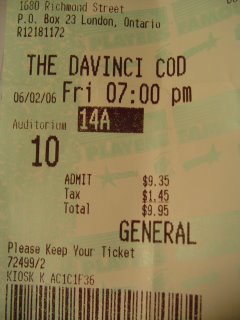
... the title for yesterday's post was not a typo.
Indeed, imagine my surprise upon looking at my theatre ticket yesterday to discover that the film version of Dan Brown's best-selling novel actually had some Newfoundland content! (I post it today because, again, for some reason I couldn't upload the picture yesterday).
The Da Vinci Cod ... this adds an interesting philosophical and historical dimension that simply wasn't in the novel. Principally, I have to wonder: was Ron Howard aware of the moratorium? However earth-shattering that cod may be, however much it might potentially shake the foundations of contemporary faith to its core, will the Royal Newfoundland Constabulary be issuing warrants for the arrest of the grail-hunters for jigging where they shouldn't have been? That whole extended chase sequence now has more immediacy, more interest. Though it would have been better filmed in St. John's.
More hills, doncha know.
Friday, June 02, 2006
My guide to the secrets of the Da Vinci Cod
Thank god for Ian McKellen. Now, I realize I tend to say that on a fairly regular basis, sometimes apropos of nothing in particular, but this time I'm quite devout in my praise, given that he was more or less the only redeeming factor in the two-and-a-half hour earnestness-fest that is the film version of The Da Vinci Code. There's something wrong when it only takes you only slightly longer to read the book than to watch the movie.
That being said, for all the arguments back and forth over the film's offensiveness, it was really just ... well, inofensive. The film has less of an edge to it than a $5 kitchen knife from Wal-Mart. This is the great slap in the face to Christians and Christianity? Puh-leaze. If this is what's going to single-handedly erode faith and belief in North America, then someone please explain to me how Trey Parker and Matt Stone have thus far avoided being drawn and quartered.
Tom Hanks was so wrong in this role. I should say, unlike many people, I have nothing against Tom Hanks -- as far as Hollywood actors go, he's pretty good, and he has a really endearing goofiness that I like. But he's waayyyyy too earnest in pretty much everything he does, and that just doesn't work here. For one thing, Robert Langdon is supposed to be one of the top scholars in his field, a Harvard prof (which really, for anything populist like Dan Brown novels or Hollywood films, is simply a cipher for really really smart -- he'd have automatically been a more interesting character for me if he was from Duke, or Berkeley, or, say, Memorial University of Newfoundland) presumably at the top of his game. Perhaps I speak as someone who spends too much time around curmudgeonly profs, but he really needed to be at least a little arrogant, to radiate the sense of being an intellectual heavyweight. He sounded more like he was an undergrad who had committed the Coles Notes of the Apochrypha to memory.
Again, thank god for Sir Ian. I sometimes wonder what must go through his head when he's filming these Hollywood blockbusters -- does he ever look around and think "I can so act circles around these dimwits!" He's the only one that looked like he was having any fun at all, gleefully cackling and frothing and generally chewing the scenery. It reminded me a bit of Alan Rickman in Robin Hood -- another case of a film taking itself way too seriously, and a great British actor being the one redeeming feature.
I did learn some things from tonight's screening however, and they are as followed:
1. Courtesy of the women sitting behind us, I now know a new word: "codey" -- adjective, pertaining to or referring to the qualities of The Da Vinci Code. To wit: as far as Dan Brown's other novels go, Angels and Demons is very codey, whereas Digital Fortress? Not so codey.
2. Smart cars drive faster in reverse than police cars do driving forward.
3. Bigshot symbology professors from Harvard, who study a vast range of history and religious cultures, are not required to learn French.
4. Kiefer Sutherland may be the new prince of scruffy, but Jean Reno is still king.
5. Eccentric British history buffs living in mansions cluttered with all sorts of arcana have digital presentations making PowerPoint look like chalk and a slate ready to go at the slightest need (such as desperate fugitives showing up at your place in the middle of the night needing a grand unification theory of conspiratorial history).
That being said, for all the arguments back and forth over the film's offensiveness, it was really just ... well, inofensive. The film has less of an edge to it than a $5 kitchen knife from Wal-Mart. This is the great slap in the face to Christians and Christianity? Puh-leaze. If this is what's going to single-handedly erode faith and belief in North America, then someone please explain to me how Trey Parker and Matt Stone have thus far avoided being drawn and quartered.
Tom Hanks was so wrong in this role. I should say, unlike many people, I have nothing against Tom Hanks -- as far as Hollywood actors go, he's pretty good, and he has a really endearing goofiness that I like. But he's waayyyyy too earnest in pretty much everything he does, and that just doesn't work here. For one thing, Robert Langdon is supposed to be one of the top scholars in his field, a Harvard prof (which really, for anything populist like Dan Brown novels or Hollywood films, is simply a cipher for really really smart -- he'd have automatically been a more interesting character for me if he was from Duke, or Berkeley, or, say, Memorial University of Newfoundland) presumably at the top of his game. Perhaps I speak as someone who spends too much time around curmudgeonly profs, but he really needed to be at least a little arrogant, to radiate the sense of being an intellectual heavyweight. He sounded more like he was an undergrad who had committed the Coles Notes of the Apochrypha to memory.
Again, thank god for Sir Ian. I sometimes wonder what must go through his head when he's filming these Hollywood blockbusters -- does he ever look around and think "I can so act circles around these dimwits!" He's the only one that looked like he was having any fun at all, gleefully cackling and frothing and generally chewing the scenery. It reminded me a bit of Alan Rickman in Robin Hood -- another case of a film taking itself way too seriously, and a great British actor being the one redeeming feature.
I did learn some things from tonight's screening however, and they are as followed:
1. Courtesy of the women sitting behind us, I now know a new word: "codey" -- adjective, pertaining to or referring to the qualities of The Da Vinci Code. To wit: as far as Dan Brown's other novels go, Angels and Demons is very codey, whereas Digital Fortress? Not so codey.
2. Smart cars drive faster in reverse than police cars do driving forward.
3. Bigshot symbology professors from Harvard, who study a vast range of history and religious cultures, are not required to learn French.
4. Kiefer Sutherland may be the new prince of scruffy, but Jean Reno is still king.
5. Eccentric British history buffs living in mansions cluttered with all sorts of arcana have digital presentations making PowerPoint look like chalk and a slate ready to go at the slightest need (such as desperate fugitives showing up at your place in the middle of the night needing a grand unification theory of conspiratorial history).
Thursday, June 01, 2006
Follow-up
Well, I was going to post a bunch of pictures to go with yesterday's post, but for some reason only the beer tent managed to upload. So to supplement the chat about the Congress and the poker game, here's some visuals.
The pre-game table:

My seat, prior to the massive chip win:
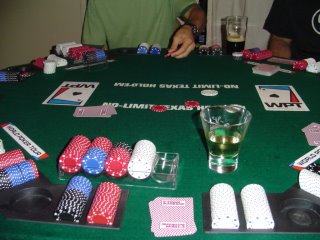
My cousin Jeff, left, and my brother Matt. You know, there must be hundreds of photos of these two in existence, and they always manage to have this exact same pose.
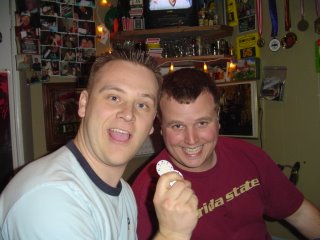
My sister-in-law Michelle brings the wee Morgan down to wish us all luck:
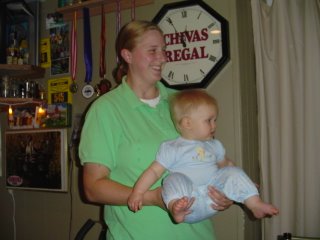
And some Congress shots. Here's the view from the entrance to the President's Reception on Sunday evening. I really hope the guy down in the lower right hand corner (a) Never sees this blog, and if he does (b) isn't a remarkably powerful person who can fuck up my career at the outset.
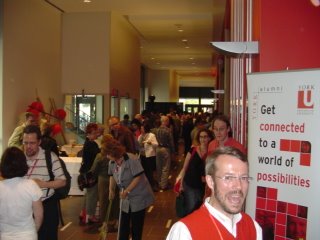
Fond memories: the outside of Winters College at York, in whose pub the Absinthe I spent many an hour in my undergrad.

It does clean up good -- I should have gone around to take some pictures of the ugly parts of York University, but it was too damn hot. So here's the Student Center.

The pre-game table:

My seat, prior to the massive chip win:

My cousin Jeff, left, and my brother Matt. You know, there must be hundreds of photos of these two in existence, and they always manage to have this exact same pose.

My sister-in-law Michelle brings the wee Morgan down to wish us all luck:

And some Congress shots. Here's the view from the entrance to the President's Reception on Sunday evening. I really hope the guy down in the lower right hand corner (a) Never sees this blog, and if he does (b) isn't a remarkably powerful person who can fuck up my career at the outset.

Fond memories: the outside of Winters College at York, in whose pub the Absinthe I spent many an hour in my undergrad.

It does clean up good -- I should have gone around to take some pictures of the ugly parts of York University, but it was too damn hot. So here's the Student Center.

Subscribe to:
Comments (Atom)
